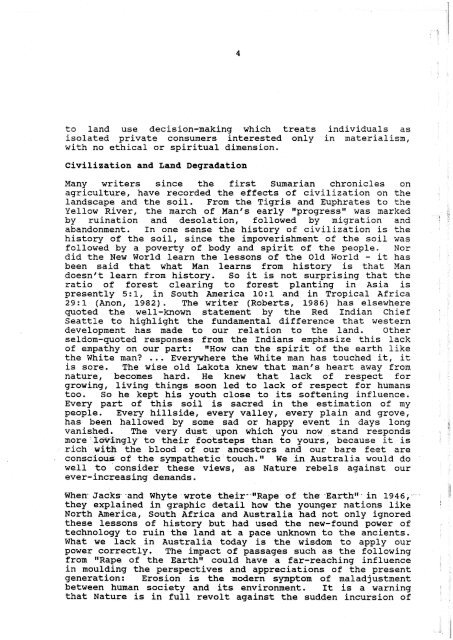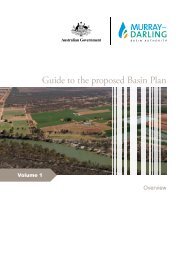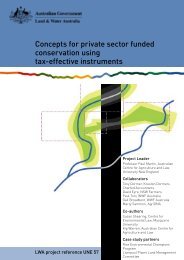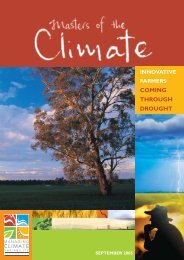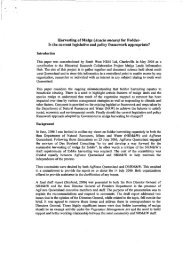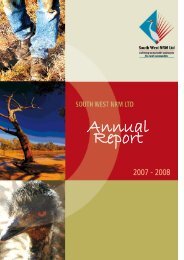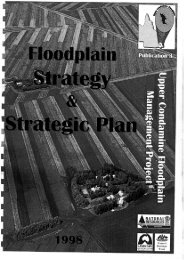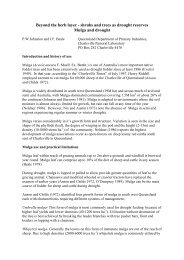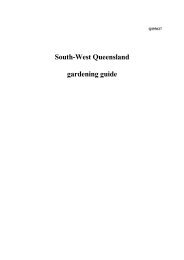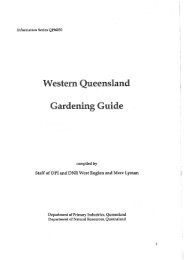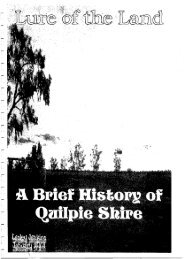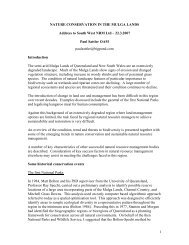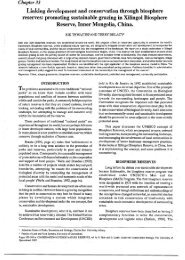soil-conservation-people-religion-and-land.pdf - South West NRM
soil-conservation-people-religion-and-land.pdf - South West NRM
soil-conservation-people-religion-and-land.pdf - South West NRM
You also want an ePaper? Increase the reach of your titles
YUMPU automatically turns print PDFs into web optimized ePapers that Google loves.
to l<strong>and</strong> use decision-making which treats individuals as<br />
isolated private consumers interested only in materialism,<br />
with no ethical or spiritual dimension.<br />
Civilization <strong>and</strong> L<strong>and</strong> Degradation<br />
Many writers since the first Sumarian chronicles on<br />
agriculture, have recorded the effects of civilization on the<br />
l<strong>and</strong>scape <strong>and</strong> the <strong>soil</strong>. From the Tigris <strong>and</strong> Euphrates to the<br />
Yellow River, the march of Man's early llprogresslq was marked<br />
by ruination <strong>and</strong> desolation, followed by migration <strong>and</strong><br />
ab<strong>and</strong>onment. In one sense the history of civilization is the<br />
history of the <strong>soil</strong>, since the impoverishment of the <strong>soil</strong> was<br />
followed by a poverty of body <strong>and</strong> spirit of the <strong>people</strong>.<br />
did the New World learn the lessons of the Old World - it has<br />
been said that what Man learns from history is that Man<br />
doesn't learn from history. So it is not surprising that the<br />
ratio of forest clearing to forest planting in Asia is<br />
presently 5:1, in <strong>South</strong> America 10:l <strong>and</strong> in Tropical Africa<br />
29 : 1 (Anon, 1982) . The writer (Roberts, 1986) has elsewhere<br />
quoted the well-known statement by the Red Indian Chief<br />
Seattle to highlight the fundamental difference that western<br />
development has made to our relation to the l<strong>and</strong>. Other<br />
seldom-quoted responses from the Indians emphasize this lack<br />
of empathy on our part: "How can the spirit of the earth like<br />
the White man? ... Everywhere the White man has touched it, it<br />
is sore. The wise old Lakota knew that man's heart away from<br />
nature, becomes hard. He knew that lack of respect for<br />
growing, living things soon led to lack of respect for humans<br />
too. So he kept his youth close to its softening influence.<br />
Every part of this <strong>soil</strong> is sacred in the estimation of my<br />
<strong>people</strong>. Every hillside, every valley, every plain <strong>and</strong> grove,<br />
has been hallowed by some sad or happy event in days long<br />
vanished. The very dust upon which you now st<strong>and</strong> responds<br />
more iwingly. to their footsteps than to yours, because it is<br />
rich with the blood of our ancestors <strong>and</strong> our bare feet are<br />
conscious of the sympathetic touch.1u We in Australia would do<br />
well to consider these views, as Nature rebels against our<br />
ever-increasing dem<strong>and</strong>s.<br />
When Jacks .<strong>and</strong> Whyte wrote their-ouwRape of the -Earthtf - in 1946,<br />
they explained in graphic detail how the younger nations like<br />
North America, <strong>South</strong> Africa <strong>and</strong> Australia had not only ignored<br />
these lessons of history but had used the new-found power of<br />
technology to ruin the l<strong>and</strong> at a pace unknown to the ancients.<br />
What we lack in Australia today is the wisdom to apply our<br />
power correctly. The impact of passages such as the following<br />
from "Rape of the Earth" could have a far-reaching influence<br />
in moulding the perspectives <strong>and</strong> appreciations of the present<br />
generation: Erosion is the modern symptom of maladjustment<br />
between human society <strong>and</strong> its environment. It is a warning<br />
that Nature is in full revolt against the sudden incursion of<br />
Nor


